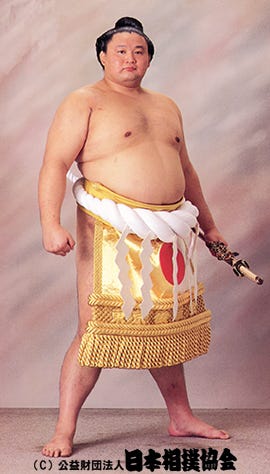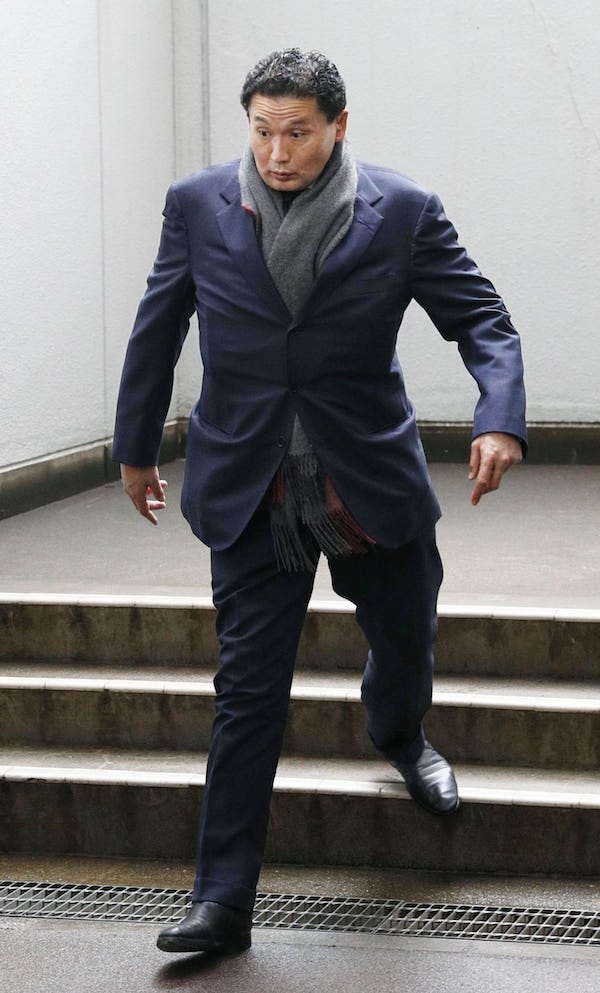RIP, Yokozuna Akebono, Dead at 54
Do sumo wrestlers die unnaturally young? What about other pro athletes?
I have a sumo-heavy profile for Akebono here, looking at his stats and his famed rivalry with Takanohana.
NY Times: Akebono, First Foreign-Born Sumo Grand Champion, Dies at 54
Taro Akebono, a Hawaii-born sumo wrestler who became the sport’s first foreign grand champion and helped to fuel a resurgence in the sport’s popularity in the 1990s, has died in Tokyo. He was 54.
He died of heart failure in early April while receiving care at a Tokyo hospital, according to a statement from his family that was distributed by the United States military in Japan on Thursday.
When he became Japan’s 64th yokozuna, or grand champion sumo wrestler, in 1993, he was the first foreign-born wrestler to achieve the sport’s highest title in its 300-year modern history. He went on to win a total of 11 grand championships, and his success set the stage for an era during which foreign-born wrestlers dominated the top levels of Japan’s national sport.
Akebono, who was 6-foot-8 and 466 pounds when he was first named yokozuna at 23, towered over his Japanese opponents. Painfully shy outside the dohyo, as the sumo ring is known, he was known for using his height and reach to keep opponents at a distance.
He retired in January 2001, when he was only 30.
But after that, after a short period of continuing as a sumo elder (which does not really pay much), he decided to continue in professional sports in various fighting sports, such as kickboxing, MMA, and Japanese pro wrestling.
In 2017, he had a medical event, which sounds like his heart gave out or maybe he had a stroke. I don’t know.
Do Sumo Wrestlers Die Young?
When it comes to Akebono and the man who sang about the three major Hawaiian sekitori:
…when you hear that IZ died at the age of 38 from respiratory failure, you may not be surprised.
But I brought this up when Terao died here:
Terao was only 60 when he died, but unlike Akebono and IZ, he wasn’t that heavy. He topped out at 255 pounds or so, which is really small for a sumo wrestler at any height (and he was about 6’1”).
He died of congestive heart failure, like Akebono.
The question comes up: do sumo wrestlers die young compared to a proper comparison non-pro-sumo wrestling population?
Probably.
In translation: [Risk factors for mortality and mortality rate of sumo wrestlers]
We compared the mortality rate of sumo wrestlers with that of the contemporaneous Japanese male population, and inferred the usefulness of an index for predicting longevity in sumo wrestlers. The standardized mortality ratios (SMR) for sumo wrestlers were very high in each period, and also high for ages from 35 to 74. Cox's proportional hazards model analysis revealed that the variables in "nyuumaku" entry year and BMI were statistically significant (p < 0.05) factors in mortality. In the survival curves, the lower BMI group had good life expectancy compared with the higher BMI group. In conclusion, the higher rate of mortality in sumo wrestlers seems to be due to the markedly higher rate of mortality from 35 to 74 years old. In sumo wrestlers, also, this study provides evidence that the higher overweight groups have substantially higher risks for mortality.
The paper was from 1995. Here is a graph from the untranslated paper.
So, there are issues here. You may say “untranslated”? (if you click through, you will see the graphs have English labels, but the text is in Japanese. All I will say is: don’t ask me.)
But one big problem is the tiny sample sizes.
The other thing is that I know what happens after the guys retire, in terms of their weight.
Takanohana was the Akebono rival mentioned in the Sumo Stats post. He’s currently 51 years old.
This is what he looked like as Yokozuna: [ca 2001]
This is what he looked like in 2018:
Some sumo wrestlers shrink to normal human size, once their pro days are over.
It takes a lot to maintain their figures.
My point is that yes, the high BMI is a stress on the health. But many drop that high BMI after their pro days are done, as it takes a lot to keep that high BMI up.
Wikipedia isn’t the best reference, but:
The sumo lifestyle has negative health effects which become apparent later in life. Sumo wrestlers have a life expectancy between 60 and 65, more than 20 years shorter than the average Japanese male, as the diet and sport take a toll on the wrestler's body. Many develop type 2 diabetes or high blood pressure, and they are prone to heart attacks due to the enormous amount of body mass and fat that they accumulate. The excessive intake of alcohol can lead to liver problems and the stress on their joints due to their excess weight can cause arthritis. Recently, the standards of weight gain are becoming less strict, in an effort to improve the overall health of the wrestlers.
Diabetes has been a problem with some wrestlers, such as Terustuyoshi, who I keep trying to do a post on and keep getting interrupted. The sumo diet (LOTS OF RICE) is bad for diabetics, frankly.
(okay, that was just an excuse to share my favorite sumo-related channel)
Not unique to sumo
I went looking for the stats I wanted, but alas, it’s thin.
But I came across this: The Football Players Health Study at Harvard
As you can imagine, there is all sorts of nasty stuff in there.
There is a lot of focus on brain trauma, but also on heart issues.
One example publication:
The red columns come from the football sample, and the blue is a general population sample. I think the arthritis and dementia results are pretty stark.
It is interesting that diabetes and high blood pressure is high in the age range where men are active, but not at older ages.
Just how intense pro sports are for men, it’s unsurprising the health effects it has both before and after the ages the men are active in their pro years. It’s clear for football and sumo, which are pretty high impact sports.
It would be interesting to see how other sports fall out in this respect.










I really appreciate this analysis. Diet predicates longevity. The weight these guys get up must put a strain on the body. I am sure the body blows also contribute to their health issues.